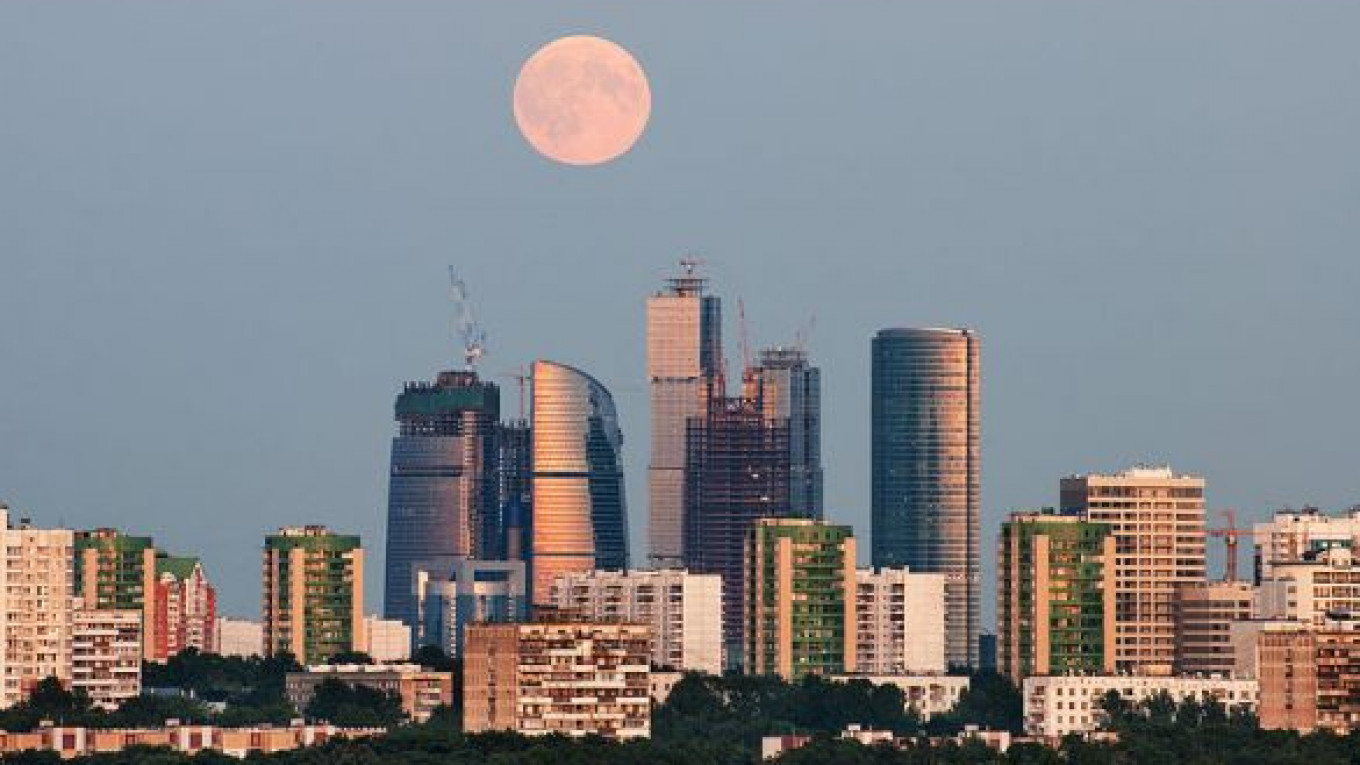Moscow is going full-out to transform itself into an international financial center, building business centers and overhauling its regulations to present an open face to investors, but the city's hopes are undermined by the lack of a skilled workforce to do the job, foreign financial advisors said Tuesday.
In recent years the Russian government has stepped up its efforts to stimulate growth in the financial sector, and harbors visions of Moscow as one of the world's leading international financial centers, on a par with London or New York.
But as of September, Moscow rated 69th in the Global Financial Centers Index, slipping down four places since March this year.
The index was prepared by the Qatar Financial Centre, set up by the Qatar government in 2005 to promote financial services development. It provides profiles and rankings for world's 80 top financial centers based on third party measures and indices and questionnaires filled in by international businessmen.
According to the index, London and New York are currently the leading global centers of finance, with Hong Kong and Singapore poised to eclipse them in the coming years.
The Russian government has set a goal for Moscow to reach 40th position in 2014. The Qatar Financial Centre, however, made no forecast that the city would increase its significance over the next few years.
An example of the government's sense of purpose is the construction of a physical international financial center in Rublyovo-Arkhangelskoye on Moscow's western edge, for which a shortlist of eight designers was selected last week.
First conceived by then-president Dmitry Medvedev in 2008, the centre will have 5.4 million square meters of office space, hotels and other commercial and social infrastructure.
But it takes more than just buildings to create a competitive and comprehensive capital market, financial analysts said.
However, in many respects, Russia has established the conditions necessary for financial activity, they added.
"A liberalization of the market started in 2006 when international banks were allowed to open ruble accounts here, followed by a permit for foreigners to buy Gazprom shares," said Danny Corrigan, chair of TheCityUK Russia, an organization that represents British financial interests.
Two years ago, a newly set up task force for the Moscow International Financial Centre chose TheCityUK as its partner to push forward development, and a delegation was in Moscow on Tuesday to discuss the initiative's progress.
Besides Russia and the Commonwealth of Independent States, TheCityUK does overseas promotion for Brazil, India, China and Turkey.
Russia has gradually become a liberal financial market through the whole scope of financial products, Corrigan said.
According to his estimates, in the next few years financial trading procedures in Russia are likely to be the same as they are in London or New York.
But a key hindrance to Russia's development as a financial center is human resources, other financial consultants said.
"One of the key drivers for building a good financial center is the availability of skilled personnel. People need to know what they are doing in order to run anything," said George Littlejohn, a senior adviser for Chartered Institute For Securities & Investment, a London-based international investment consultancy.
While Russia does have quite a few skilled professionals, their qualifications need to be better tuned to their future workplace, and this has to be done at the university level, he said.
Moscow today has a large number of people employed in the financial sector but far too many of them are engaged in short-term trading or in other areas focused on short-term returns, said Chris Weafer, a senior partner with Macro Advisory, a Russia-based investment consultancy.
"For an international financial center to be successful, there needs to be a greater number of people engaged in building for the longer-term," he added.
In order to tackle this problem, a memorandum of understanding was signed between Britain and the Russian Financial University on training and qualifications in financial services on Tuesday.
This will enable Russian students to exchange experience with their British counterparts and vice-versa, hopefully generating the necessary skills in the process.
While a top-ranking financial center certainly needs a large number of skilled bankers, a whole range of complementary skill sets and experiences have to be also brought together.
"One of the reasons why London, for example, remains the top spot global financial center is because it has tremendous depth in support services, that is, in legal, insurance, financial IT, foreign exchange, etcetera," Weafer said.
London also has more than 100 years of experience in conducting financial business which it can draw on, he added.
Moscow, by comparison, has a history in modern financial practice of about 20 years.
Contact the author at [email protected]
A Message from The Moscow Times:
Dear readers,
We are facing unprecedented challenges. Russia's Prosecutor General's Office has designated The Moscow Times as an "undesirable" organization, criminalizing our work and putting our staff at risk of prosecution. This follows our earlier unjust labeling as a "foreign agent."
These actions are direct attempts to silence independent journalism in Russia. The authorities claim our work "discredits the decisions of the Russian leadership." We see things differently: we strive to provide accurate, unbiased reporting on Russia.
We, the journalists of The Moscow Times, refuse to be silenced. But to continue our work, we need your help.
Your support, no matter how small, makes a world of difference. If you can, please support us monthly starting from just $2. It's quick to set up, and every contribution makes a significant impact.
By supporting The Moscow Times, you're defending open, independent journalism in the face of repression. Thank you for standing with us.
Remind me later.






